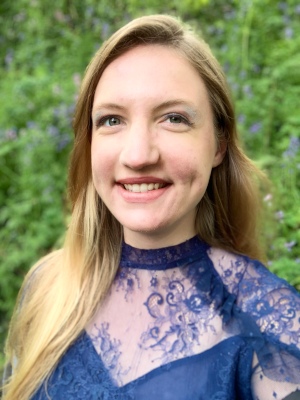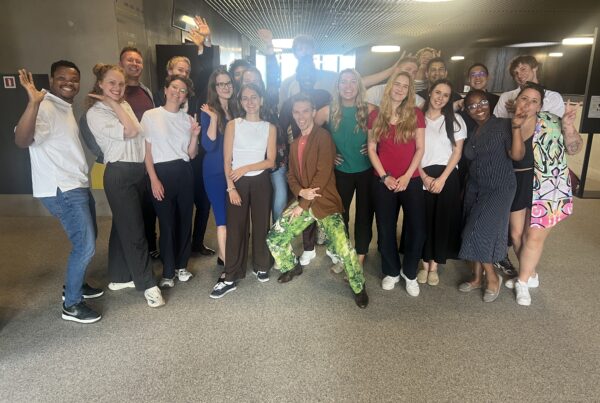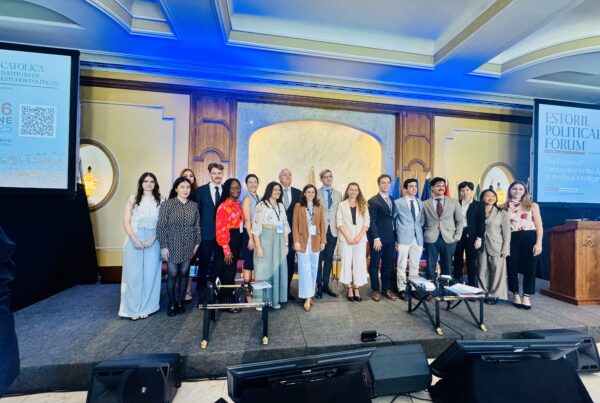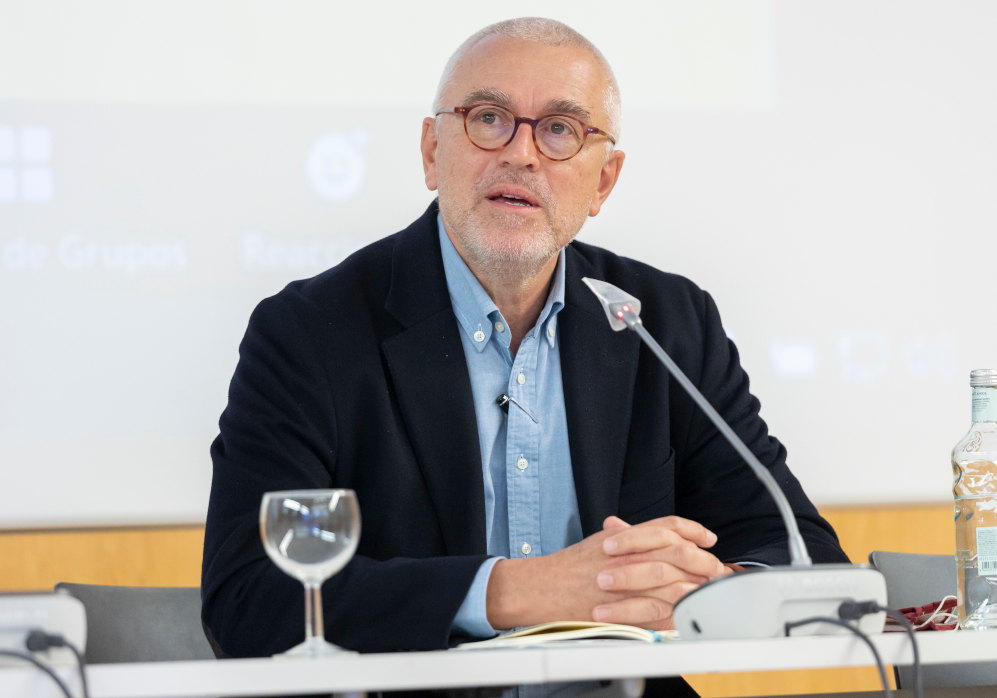
Report by Dr Dimitar Bechev, Acting Programme Director for Core Activities
The Winter School, hosted by UPF in Barcelona, explored a set of complex, interrelated and systemic issues affecting the wellbeing of humans, animals and the planet itself. It tackled issues such as environmental sustainability, the drivers and responses to climate change, global health in the era of the COVID-19 pandemic, and bioethics. The Winter School brought together a dynamic group of scholars from Europe, the United States and Australia and a group of 26 students from across the Europaeum network, including Oxford, Geneva, Munich, Tartu, UPF, Lisbon, Prague, St Andrews, Helsinki and Luxembourg. For health reasons, the format was hybrid, with the UPF participants taking part in person and the rest of the participants attending via Zoom. The sessions were recorded and will be made available through both the UPF and Europaeum websites.
The Winter School opened with a keynote lecture by Will Steffen from the Fenner School of Environment and Society at the Australian National University (ANU), Canberra. Drawing on a wealth of historical and contemporary data across several academic disciplines, he interrogated the concept of the Anthropocene. He discussed climate change in its broad context, considering the impact on the economy and society, and charting scenarios for the future. The next session was a panel dedicated to the role of universities in respect of planetary wellbeing, notably the experience at UPF. This featured papers by UPF professors Josep Maria Antó, Jose Luis Martí, Rector Jaume Casals, and Lela Mélon. They discussed the UPF Planetary Wellbeing Initiative and the challenges of teaching sustainability.
Panel 2 dealt with the question of whether it is possible to integrate humans and the planet in a single concept. It examined challenges to measuring wellbeing and progress. Papers were given by Paula Casal (Co-Director of the Centre for Animal Ethics at the UPF Law Department), Marc Fleurbaey (an authority on measuring wellbeing based at the Paris School of Economics and the CNRS – the French National Centre for Scientific Research) and Timothy Morton (a Rice University professor of English who is expert in areas such as Ecological Cultural and Literary Criticism and has collaborated with stars of popular culture such as Björk, Jeff Bridges and Pharrell Williams.) The Europaeum students then had an opportunity to discuss the issues raised so far and form working groups to consider how universities might be transformed.
The second day opened with a keynote speech by John Elkington, a world authority on corporate responsibility and sustainable capitalism, bestselling author, and serial entrepreneur. He is the creator of the ‘triple bottom line’ concept, an innovative accounting framework that encourages organisations to evaluate their performance in three parts – social, environmental and financial – to gain a broader perspective on business value. More recently, he founded Volans, an organisation that works with business leaders to help them understand impending challenges and how they can take practical action towards a sustainable and successful future. In so doing, he has helped to create and incubate the global sustainability movement.
This speech set the scene for a panel on complexity and urgency in ensuring global wellbeing moderated by Cristina Pujades, head of the group studying the development of the central nervous system of vertebrates at UPF’s Department of Experimental and Health Sciences, DCEXS-UPF. Ricard Solé, who heads UPF’s Complex Systems Lab, drew on his work combining biology, physics and network theory to present on ‘Bioengineering the biosphere with synthetic biology’. Ortwin Renn, Scientific Director at the Institute for Advanced Sustainability Studies (IASS) in Potsdam, Germany, then spoke on ‘Systemic Risks: Coping with complexity in a post-truth era’. Finally, Lydia Cole, a Conservation Ecologist at the University of St Andrews with a keen interest in how tropical ecosystems can be managed sustainably in the face of agricultural expansion and the other pervasive impacts of population growth and globalisation, spoke on ‘Whose knowledge? And who wants change? Collaboration for conservation.’ The day ended with an interactive session at which students presented and discussed their own research.
Day 3 included a plenary debate on integrating interdisciplinary knowledge into policy making on wellbeing. It featured Andy Haines, Professor of Environmental Change and Public Health at the London School of Hygiene and Tropical Medicine in London on the subject of ‘From knowledge to action for planetary health’. Adrienne Cheasty, who while Deputy Director of the IMF’s Fiscal Affairs Department established the IMF’s Climate Change Policy Assessment programme, then spoke on ‘The IMF and sustainable finance’. The panel was rounded off by Pedro Conceição, Director of the UN’s Human Development Report Office, who spoke on his work. After the break, the students then regrouped to continue their discussion on how to transform universities.
The afternoon saw the conference decamp to the Barcelona Museum of Contemporary Art (MACBA) for Panel 5 – ‘The Agency of Art’ – chaired by Isabel Valverde. This session reflected on how art can help us to understand and respond to the challenges of the 21st century. It started with the streaming of the vídeo ‘A Forest’ by Max de Esteban. The panel included perspectives from an art theorist (T.J. Demos of the University of California at Santa Cruz on contemporary art and climate justice), a philosopher (Santiago Zabala, ICREA research professor in UPF’s Department of Humanities asking ‘Why and How can Art rescue us into the Greatest Emergencies?’) and a curator (Claudia Segura of MACBA).
The last day of the Winter School dealt with the challenges of implementing policies. John Dryzek of the University of Canberra’s Centre for Deliberative Democracy and Global Governance addressed the issue of governance in the Anthropocene. Phoebe Kondouri, Director of the Research laboratory on Socio-Economic and Environmental Sustainability (ReSEES), Athens University of Economics and Business, looked at the integration of complex interdisciplinary knowledge into policy, while Heidi Hautala, Vice-President of the European Parliament and MEP from the Green/EFA group, offered a perspective from politics.
Students’ perspectives
The Europaeum’s cross-disciplinary approach ensures that students are challenged and stimulated by fresh perspectives. This event was no exception with ideas contributed by neuroscientists to environmentalists, financial experts to philosophers. Many thanks to St Andrews students Mary Abed Al Ahad and Emma Johanna Puranen for explaining below how the event proved worthwhile for students with very different research interests.
“I’m a 2nd year PhD student at the University of St Andrews. My work is interdisciplinary — I study exoplanets (planets outside our solar system) as they appear in science fiction. In my work with science fiction I spend a lot of time thinking about how humans (and aliens!) interact with their planetary environments, and how science fiction authors imagine Earth and other planets. This inspired me to sign up for the Europaeum Winter School in Planetary Wellbeing. I had a wonderful time listening to speakers from a variety of backgrounds, from the sciences to policy to art and everything in between. A highlight of the week was the chance to work in a breakout group of fellow students on designing our idea of what a green university of the future would be like. Though we all had different academic backgrounds, we learned that by chance a lot of us in our group studied media in some form or another. It was very enriching to see the different angles everyone took, and to get a chance to share my research and hear them present their own. The Winter School was an excellent experience of networking and broadening my research horizons.”
Mary Abed Al Ahad
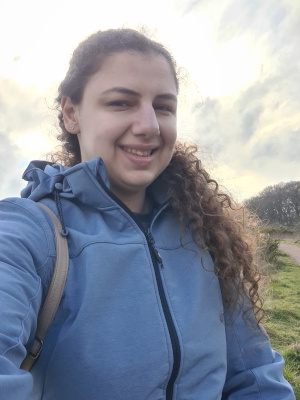
“I am a 3rd year PhD student researching into the effect of air pollution on mental wellbeing, health, mortality, and hospital admissions in the UK. Throughout my research, I have found that air pollution affects negatively individuals’ physical health and mental wellbeing. I was therefore very interested to attend the Europaeum Winter School on Planetary Wellbeing. I greatly enjoyed the variety of the speakers’ research and the interweaving between the different topics discussed in the school, all under the theme of planetary wellbeing. The school provided me with an enriching experience, not only in learning about the participants’ and keynote speakers’ views, but also through contributing my own views in the discussions and breakout sessions and hearing others’ responses to them. The communication, networking and new ideas were very stimulating. I am glad I attended.”

